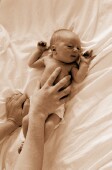
WEDNESDAY, Dec. 8 (HealthDay News) — Sudden infant death syndrome, or SIDS, has for years had a reputation as a mysterious and terrifying killer of newborns.
But medical researchers now think they have cracked the secret of what causes babies to die of SIDS, an advance that could save hundreds of lives each year.
Doctors have found that babies who die of SIDS tend to have significantly lower amounts of serotonin than babies who die of other causes. Serotonin is a hormonal neurotransmitter closely linked to many of the body’s vital functions, including the sleeping cycle.
A lack of serotonin is suspected to hamper a sleeping baby’s ability to wake up when its safety is threatened by a lack of oxygen or some other health hazard, said Dr. Rachel Y. Moon, a pediatrician, SIDS researcher and associate chief of the division of general pediatrics and community health at the Goldberg Center for Community Pediatric Health at Children’s National Medical Center in Washington, D.C.
“We think a lot of it has to do with arousal, and how babies can wake up when they are asleep,” Moon said. “If you have a baby who gets into a compromised situation and they are becoming hypoxic, there are some babies who are sleeping so deeply or have an arousal defect that they can’t wake up.”
SIDS is the leading cause of death for babies between 1 month and 1 year of age, according to the U.S. National Institutes of Health. Most SIDS deaths occur between the ages of 2 months and 4 months, and more than 2,200 U.S. infants die of SIDS every year.
These deaths are sudden and unexplained, even after doctors perform an autopsy and review the infants’ health. Since most of these deaths happen when the babies are sleeping, SIDS is known to many as “crib death.”
Researchers believe that some sort of birth defect leads to the serotonin deficit in some babies, said Laura Reno, vice president of public affairs for First Candle, a nonprofit organization dedicated to the study and prevention of SIDS.
Some of the most recent research came from work headed by Dr. Hannah C. Kinney, a neuropathologist at Children’s Hospital Boston and a professor of pathology at Harvard Medical School. Kinney, a leading SIDS researcher, and her colleagues found that serotonin levels of 35 babies who died of SIDS were 26 percent lower than those of babies who died of known causes. The SIDS infants also had 22 percent lower levels of tryptophan hydroxylase, an enzyme that helps make serotonin.
Serotonin is suspected to be crucial to a baby’s arousal system, which Reno likened to an “alarm” that wakes a baby up when the infant’s health is compromised.
“In these babies, the alarm doesn’t sound,” Reno said. “They continue to sleep even if there is a challenge in their environment, which then causes them to die.”
Environmental hazards that could lead to a SIDS death, Reno said, include:
- Belly sleeping. Infants allowed to sleep on their stomachs end up rebreathing their own exhaled air rather than fresh air. “They are taking in carbon dioxide instead of oxygen,” which creates an oxygen deficiency that can result in death, Reno said.
- Overheating. Babies dressed too warmly or swaddled in thick blankets can become too warm for their own health. “These babies get too heated and, again, the alarm doesn’t sound,” she said.
- Too much soft and fluffy bedding and pillows in a crib also can cause a baby to smother. Babies who sleep in the same bed as their parents also are more likely to die of SIDS, Reno said.
- Smoking. Cigarette smoke robs sleeping babies of needed oxygen. Secondhand smoke, she said, is “really dangerous for these babies.”
The next step in research would be to find a way to identify babies who suffer from a natural lack of serotonin. “That would be the goal, because then we would be better able to target messaging,” Moon said.
In the meantime, parents are urged to follow the recommendations that doctors have been issuing for years to limit SIDS deaths:
- Always place babies on their backs to sleep. Since the American Academy of Pediatrics issued this recommendation in 1992, SIDS deaths have dropped by more than half, according to the Nemours Foundation.
- Place babies on a firm sleeping surface with a tightly fitted sheet. Don’t allow a baby to sleep on a pillow, quilt or other soft surface.
- Dress babies in light clothing for sleep, and keep the room at a temperature that adults would find comfortable.
- Give babies a pacifier when putting them down to sleep. Studies have found that babies who use pacifiers are less likely to die of SIDS. “We think it may change the baby’s arousal threshold, or the way the baby breathes,” Moon said.
These are guidelines that parents should follow regardless of whether they believe their child may suffer from a serotonin deficiency, Moon added.
“Babies do suffocate,” she said. “Babies do get trapped between mattresses and other things. So these safe-sleep recommendations will help protect against those things as well.”
More information
The U.S. National Institute of Child Health and Human Development has more on SIDS.
For more on SIDS, read about one mother’s experience.

